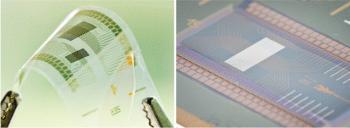The European MOMA project (eMbedded Organic Memory Arrays) has developed the largest re-programmable non-volatile memory arrays yet produced on flexible substrates. The project developed two prototypes - a 256-bit transistor-based one and 1-kbit diode-based arrays.

MOMA is now drawing to a successful close, and the partners hope that it will lead towards commercialization of flexible electronics applications with embedded memory. In the remaining months of the project, the partners will combine all these building blocks into a 96-bit array with the related read/write circuitry, creating a complete embedded flexible memory suitable for applications such as Electronic Product Code (EPC) tags.
Partners in the MOMA consortium include STMicroelectronics, Solvay, imec, Holst and others. The project focuses on ferroelectric memories based on soluble ferroelectric polymers and organic and oxide semiconductors. It has successfully developed new grades of memory materials that can be tailored to specific applications and deposition techniques (including spin-coating, inkjet printing and imprinting). The project partners used these materials to develop memory arrays based on both transistors and diodes, optimizing production processes to deliver high yields and excellent memory performance.

